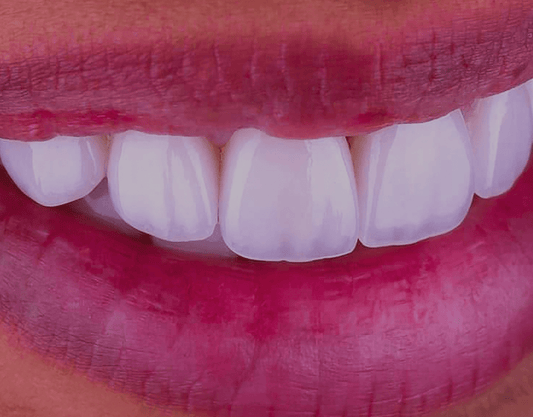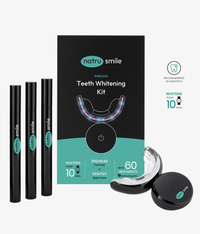
All products are certified by dental expert Dr. Greg Grillo
Unlike teeth whitening kits, veneers provide a permanent solution to tooth whitening. Although these tooth-colored composite shells are designed to be stain-resistant, they can still discolor over time.
Despite their costs, people still seek out teeth whitening treatments. More than 45 million individuals in the US, or around 14% of its population, have had their teeth whitened professionally.
To ensure that your money is well spent, it is necessary to keep your veneers white. Whitening composite veneers is also particularly challenging since they are not as durable as porcelain veneers. Now the question is, “can you whiten veneers?”
Whether you've just had your first set of porcelain or composite veneers fitted or have lived with them for years, read on to find everything you need to know about whitening veneers.
How Do Veneers Become Discolored?
Veneers are made of either porcelain or composite materials, and they are often used to improve the appearance of teeth that might be chipped, cracked, discolored, or otherwise misshapen.
Although veneers are generally very durable and can last for many years with proper care, they can become discolored over time for a variety of reasons.
Staining From Foods And Drinks
Veneers, while they are more resistant to staining than regular teeth, can still be discolored by certain foods and beverages. Generally, these may leave stains on the surface of your veneers if you do not clean them off soon after consuming them.
An example of this is that coffee has tannins, which are a form of polyphenol that dissolves in water. These same tannins can also be seen in drinks such as wine or tea. They have the ability to cause pigments to adhere to one's teeth and veneers. If not cared for, they may leave behind an undesired yellowish tint.
Poor Oral Hygiene
Although veneers are highly resistant to decay, it is still necessary to practice proper dental hygiene, as plaque can build up around the tooth and gums. If left untreated, this can lead to decay of the underlying tooth, which puts your veneer at risk of damage.
Furthermore, while porcelain veneers are generally stain-resistant, they are not completely immune to staining, so regular brushing and flossing should be done in order to keep them looking their best.
Wear And Tear
Over time, around ten years with proper care, veneers may become discolored due to wear and tear on the enamel layer beneath them.
This is because as we bite down on our food and drinks, microscopic particles get caught in between our teeth which leave tiny scratches in the enamel with usage. This damage eventually weakens the protective layer beneath the veneer, causing it to discolor.
Improper care or excessive wear can also lead to discolored veneers. If you are not careful when brushing your teeth, you could wear away the surface of your veneers, making them prone to damage and discoloration.
What Could Have Caused Your Veneers To Change Color?
Veneers are an effective way to give your smile a makeover and enhance the overall appearance of your teeth. But sometimes, after you've had veneers put on, they can change color or become discolored.
This could be disheartening and frustrating if you are hoping for an immaculate smile. So what could have caused your veneers to change color?
Injury Or Damage
The most common cause of discoloration in dental veneers is trauma or injury. This could include chipping, fracturing, breaking, or cracking of the material as a result of physical force, such as biting down on hard foods too forcefully or grinding teeth at night.
Additionally, veneers may become discolored due to poor fit or improper placement, which may lead to the veneer rubbing against the adjacent tooth and wearing away its natural color.
Age
The color of your dental veneers can change as you age. Over time, exposure to food and drinks, as well as lifestyle habits such as smoking or drinking coffee and tea, can all cause the color of veneers to change.
Some types of medication, such as antihistamines or antibiotics, have been known to affect the shade of porcelain teeth by causing them to become more translucent or yellowish in appearance.
That being said, you should be able to expect your veneers to last for many years to come. Your dentist should be able to provide you with advice on how to look after your dental veneers in order to ensure that they remain in good condition for as long as possible.
Should I Replace My Veneers?
At the end of the day, veneers are merely cosmetic dental accessories that are designed to improve your smile. There will come a time when it will be necessary to replace them, but by taking proper care and using the proper materials, you can extend their service life.
The right way to know if your veneers need replacing is by consulting your dentist. They can assess the condition of your veneers and advise you on whether they should be replaced or repaired. In some cases, it may be possible to repair damaged veneers instead of removing them.
If your veneers are severely worn down or cracked, however, they will probably need to be replaced in order to provide optimal protection and aesthetics.
You should consider the cost of replacing your veneers before making a decision. Replacement is usually more expensive than repairing existing ones since it requires new materials and labor costs to bond them onto your teeth again.
The cost of dental veneers can cost around $1,000 per tooth or more, and this adds up quickly when you factor in the number of teeth involved. Keep in mind that insurance also does not cover cosmetic treatments, such as veneers, so this should be taken into account when budgeting for them.
Having said that, if you are getting new materials for your veneers, it may be worthwhile to spend more for higher quality. In general, porcelain veneers offer greater value for money than composite veneers since they are stronger and more natural-looking.
Is It Possible To Whiten Veneers?
Unfortunately, traditional teeth whitening options are not effective on permanent or temporary veneers, as they cannot alter the material’s color. Even though these products may be used to brighten your natural teeth, their combination with your stained veneers may cause an unevenly pigmented smile.
Also, if the staining has become more ingrained in the veneers, or if they are snap-on veneers made from composite resin instead of porcelain, then professional whitening may be necessary.
While veneer whitening at home is not easy, a dentist can always help you improve their appearance if you are concerned about discoloration. It may also be possible to have the device professionally cleaned or replaced when necessary.
How Can You Brighten Veneers?
As beautiful as veneers are when first applied, veneers can become dull over time. There are several ways you can help maintain the appearance of veneers and keep them bright for many years to come.
- Use a gentle polishing toothpaste - If you're noticing discoloration around the edges of your veneers, a toothpaste designed for polishing can help to restore its whiteness. Make sure not to use any bleaching or abrasive toothpaste, as they can cause uneven color between veneers and natural teeth.
- Maintain good oral hygiene - This includes brushing twice daily and flossing once a day. This can help remove surface stains from coffee, tea, wine, tobacco, and other foods that can dull the appearance of your veneers over time.
- Schedule regular professional cleanings - Your dental professional will be able to gently remove any plaque buildup or discoloration from the surface of your veneer without causing any damage.
If your veneers are still looking discolored, it is likely that they need to be repaired or replaced.
We have compiled a list of frequently asked questions about veneer whitening at home, as well as other inquiries that you may have about whitening veneers.
Is There Toothpaste To Whiten Veneers?
When it comes to your veneers, picking the right toothpaste is essential. Make sure you avoid any that contain mild abrasives and instead opt for one which will help reduce cavities and decay while also strengthening enamel.
Fluoride-based toothpaste is an ideal choice because it has been proven to fight tooth decay, which can be a cause of dental veneer complications or failure. Using fluoride can also extend the life of your veneers.
Toothpaste that contains baking soda as an ingredient can help whiten natural teeth, but it is not ideal for veneers. The abrasive nature of baking soda may cause discoloration or damage to the veneer material.
Can You Change The Color Of Your Veneers?
You have the option to choose a veneer color. After your veneers have been put in, however, they will stay the same color. If you want to alter the shade of your smile, it would require a complicated and costly process of having them removed and replaced with a new set.
You are within your rights to request fresh porcelain veneers, although this may be time-consuming and inconvenient. Since what you paid for was not what was delivered, you should ask your dentist for reimbursement and consider finding another dental technician who can assist you.
Can You Make Veneers Less White?
Once porcelain veneers are affixed to your teeth, they are not able to be altered. It is impossible to make them lighter or darker after the procedure has been completed.
This emphasizes the importance of visiting a cosmetic dentist specializing in cosmetic dentistry in order to avoid issues regarding your aesthetic preferences. Getting veneers on crooked teeth is a big commitment, so you should always have a cosmetic dentistry specialist at the helm.
Can Hydrogen Peroxide Whiten Veneers?
Teeth whitening involves utilizing lighteners like hydrogen peroxide to break down and remove discolorations. While this is effective for natural teeth, dental veneers, unfortunately, do not respond positively to bleaching substances. The best approach for brightening veneers is by visiting your trusted dentist.
How Long Do Veneers Stay White?
If you take proper care of your veneers, such as regular brushing, flossing, and dental visits as per the recommendation of your dentist, they can stay brilliant for up to ten years or even longer. Once they have been in use for ten years, it will most likely be time to replace or repair them.
Why Do Veneers Turn Black?
As veneers thin near the gum line and recede over time, metal portions can be exposed, resulting in dark lines where it is visible. Additionally, bacteria can accumulate between teeth and veneers if a dentist does not bond them closely enough. This condition allows bacteria to seep in and cause discoloration.
Final Thoughts
Veneer whitening at home isn't a simple process and should be done with caution. If you're determined to brighten up the color of your veneers, there are various treatments available that can help lighten them without damaging their structural integrity or causing any permanent damage.
It is, however, best to consult your dentist to know if your veneers need to be repaired or replaced. You will be able to protect your teeth while making sure you gain the most benefit from your veneers, as well as improve your smile for many years to come.












